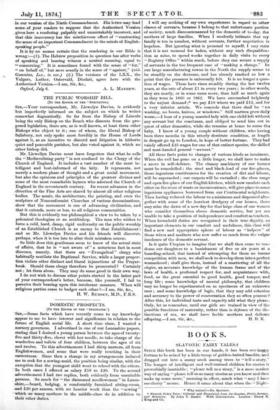DOMESTIC. PROSPECTS.
[TO THE EDITOR OF THE " SPECTLTOR.1
Sin,—Some -facts which have recently come to my knowledge :appear to me to have interest and significance in relation to the future .of English social life. A short time since, I wanted a nursery, governess. I advertised in one of our Lancashire papers, stating that I desired a young person between the ages of twenty- five and thirty-five, clever with her needle, to take charge of the wardrobes and toilets of four children, between the ages of six and twelve. To this advertisement I had thirty answers, all from Englishwomen, ,and some that were really touching in their earnestness. Since then a change -in my arrangements induced me to seek for a sewing-maid, •the position being similar, with-the exception-that the youngest child went to school with the others. In both cases I offered as salary £18 to £20. To the second -advertisement I had Iwo replies, both evidently from unsuitable persons. So much for "-the distressed needlewoman " in Lance- shire,—board, lodging, a comfortably furnished sitting-room, And £20 per annum, with no heavier work than the " sewing " which so many mothers in the middle-class do in addition to their other duties. I will say nothing of my own experiences in regard to other classes of servants, became belong to-that unfortunate portion of society, much discountenanced by the domestic of 'to-day, the mothers of large families. When I modestly intimate that my family is ten in number, without servants, further negotiation is hopeless. But ignoring what is personal to myself, I may state that it is not unusual for ladies, without any -such disqualifica- tion as mine, to spend weeks together in daily visits to every " Registry Office " within reach, before they can secure a supply of servants in the too frequent case of " making a change." In our large manufacturing towns in the North the supply seems to be steadily on the decrease, and has already reached so low a point that the pressure is universally felt. It is no longer a ques- tion of wages. These have risen steadily during the last twelve years, at the rate of about £1 in every two years ; in other words, they are nearly, or in some cases more, than half as much again as they were in 1860 or 1862. We have succumbed helplessly to the unjust demand ;* we pay £18 where we paid £12, and for a very inferior article. We concede that there shall be "no washing, no boots, knives, or windows." -Still matters grow daily worse,—I hear of a young married lady with one child left without any servant but the coachman, and obliged to send him out in quest of other domestics, while she remains at home to nurse the baby. I know of a young couple without children,-who having been three months in this utterly destitute condition, at length in despair go up to London, in hope of better fortune. They bad vainly offered £25 wages for one of that extinct species, the skilled and neat-handed general "servant."
All these facts point to changes of various kinds as imminent. When the evil has gone on a little longer, we shall have to make a move in self-defence. The clumsy machinery of our houses must be remodelled ; the steel and black-lead of our fire-places, those ingenious contrivances for the creation of dirt and labour, will be superseded ; our carpets will •be curtailed ; the close range and open fire-place of our English kitchen, which now emulate each other on the score of waste or inconvenience, will give place to some ingenious appliances borrowed from our Continental neighbours. Then having reduced the labour to a minimum and dispensed alto- gether with some of the ,heaviest drudgery of our homes, there may arise the dawn of a new day for that large class of our women who consider themselves above domestic service, but -yet are unable to take a position of independence and comfort as teachers. When household duties are recognised in their true dignity, as important elements in our comfort and usefulness, this class will find a new and appropriate sphere of labour as " helpers " of those wives and mothers who now suffer so much from the vulgar insolence of the domestic servant.
Is it quite Utopian to imagine that we shall then cease to con- demn our daughters to a banishment of five or six years at a boarding-school, that instead of attempting for them an insane competition with men, we shall seek to develop them into a perfect womanhood ; shall give them, instead of a smattering of -all-the elegies, an accurate knowledge of the human frame and -Of 'the laws of health, a profound respect for, and acquaintance -with, food, as the great essential to good health, good temper, And long life ; some knowledge of mental philosophy, that children may no longer be experimented on as specimens of an unknown race ; and some knowledge of logic, that they may add cohesion and accuracy to the power of conversation they so often possess ? After this, let individual taste and capacity add what they please. Only, let us remember, until our girls are trained in view of the possible functions of maternity, rather than in defiance of the dis- tinctions of sex, we shall have feeble mothers and delicate


































 Previous page
Previous page